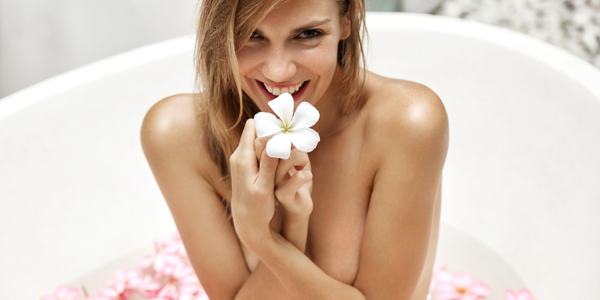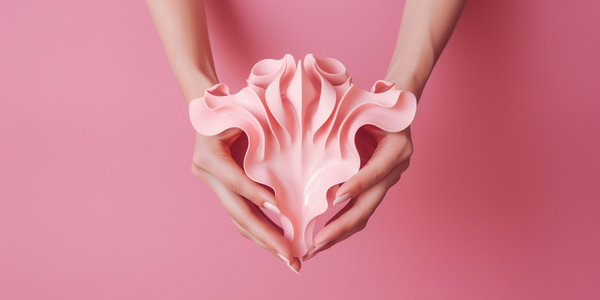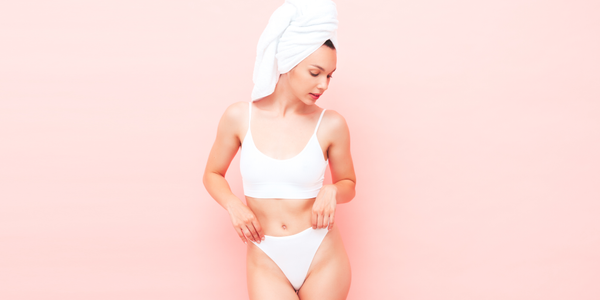Myths and Truths: How Intimate Hydration Transforms your Well-being and Sex Life
Recomienda este artículo:

When it comes to taking care of our body, we tend to focus on the skin on our face, our hair, or maintaining a healthy figure. However, hydration of our intimate area is just as important and deserves the same attention and dedication.
Good intimate hydration not only gives you comfort and freshness, but is also essential to prevent discomfort, irritation and infections. Plus, did you know that proper hydration can significantly improve your sexual experience? That's right, that perfect balance will not only make you feel good, but it can also take your intimate life to another level.
What is Intimate Hydration and Why is it Important?
Intimate hydration refers to the level of moisture and natural lubrication present in our vaginal area. This hydration is regulated by a delicate balance of factors, including hormones, age and general health. When this balance is maintained, our intimate area feels comfortable, flexible and healthy.
But why is it so important to maintain good hydration in this area? First of all, adequate hydration helps prevent discomforts such as dryness, irritation and a feeling of tightness. These problems are not only uncomfortable, but they can also make you more susceptible to infections and the appearance of cracks or wounds in the delicate skin of your intimate area.
Additionally, hydration plays a key role in our sex life. During arousal, our body produces natural lubrication to facilitate penetration and reduce friction. If there is not enough hydration, sexual intercourse can become painful or uncomfortable, which negatively affects sexual experience and desire.
Factors That Affect Intimate Hydration
Now that we understand the importance of intimate hydration, it is crucial to know the various factors that can alter this delicate balance. Some of these factors are a natural part of life, while others may be a result of our lifestyle choices.
One of the most significant factors is hormones. During the menstrual cycle, estrogen levels fluctuate, which can affect intimate hydration. Menopause is also a time of major hormonal changes, during which many women experience vaginal dryness due to decreased estrogen levels.
Certain medications can also influence intimate hydration. For example, some antihistamines, contraceptives, antidepressants, and cancer treatments can have side effects including vaginal dryness. If you are taking any medication and notice changes in your intimate hydration, it is important to talk to your doctor.
Practical Tips to Maintain Perfect Balance
Now that you know the factors that can affect intimate hydration, it's time to take action. Here we present some practical tips to maintain that perfect balance and take care of your intimate area.
First of all, pay attention to your daily intimate hygiene. Opt for products specifically formulated for the area, with a balanced pH and without perfumes or irritating ingredients. Remember, the vaginal area is self-cleaning, so it is not necessary to use harsh soaps or douches. A gentle wash with water and a trusted intimate cleanser is sufficient.
Maintaining good general hydration is also key. Make sure you drink enough water throughout the day and consider incorporating water-rich foods, such as fruits and vegetables, into your diet. Good general hydration is reflected in good intimate hydration.
For superior hydration, you can opt for products specifically designed for intimate hydration. Look for ingredients like hyaluronic acid, known for its ability to retain moisture. Our Intimate Moisturizing Gel with Hyaluronic Acid is an excellent option to provide gentle and long-lasting hydration to your intimate area.
Another important tip is to choose underwear made of breathable materials, such as cotton. Avoid tight synthetic fabrics that can trap moisture and create an environment for irritation and infection. And if you're prone to sweating, consider changing your underwear mid-day to stay cool.
Staying active with regular exercise can also promote good blood circulation and maintain the health of your intimate area. Additionally, maintaining open communication with your partner about any discomfort or changes can help ease anxiety and find solutions together.
And as a side note, in some cases, especially during menopause, hormone replacement therapy under a doctor's supervision may be an option to relieve symptoms of vaginal dryness. Don't hesitate to discuss this possibility with your gynecologist if you think it might be right for you.

Myths and Truths About Intimate Hydration
In the world of intimate health, myths and half-truths abound. These misconceptions can lead us to practices that, instead of promoting our intimate hydration, can harm it. Let's debunk some of the most common myths and reveal the truths behind them.
Myth: The vagina needs to be washed thoroughly with strong soaps to be clean.
Truth: The vagina has its own cleaning system. It contains a delicate balance of beneficial bacteria that help keep it healthy. Using harsh soaps or douching can upset this balance and end up causing dryness and irritation.
Myth: Intimate hydration naturally decreases with age and there is nothing you can do about it.
Truth: While it is true that age and menopause can lead to a decrease in intimate hydration due to hormonal changes, this does not mean that nothing can be done. There are many products, such as intimate moisturizers and lubricants, that can help relieve dryness and discomfort.
Myth: All women experience intimate moisturizing in the same way.
Truth: Every woman is unique and may experience intimate moisturizing differently. Some may experience dryness from time to time, while others may have chronic problems that should be reviewed with a specialist.
Intimate Hydration Throughout Life
Just as we evolve and change throughout life, our intimate hydration needs do too. Each stage of a woman's life brings with it unique hormonal and physical changes that can affect the hydration of our intimate area. Let's explore these stages and how we can adapt to them.
Beginning with puberty, our body begins to produce more estrogen, which leads to the development of secondary sexual characteristics and the onset of menstruation. At this stage, it is common to experience more vaginal discharge due to hormonal changes. It is important to establish a good routine using gentle, unscented products to avoid irritation.
During pregnancy and after childbirth, many women experience changes in their intimate hydration. Hormonal fluctuations and increased blood flow to the pelvic area can lead to increased hydration. However, after childbirth, especially if there was a tear or episiotomy, there may be temporary dryness and discomfort. In these cases, a long-lasting intimate moisturizer, such as our Long Lasting Feminine Moisturizing Gel with Hyaluronic Acid, can provide lasting relief, and is also ideal for intimate use due to its unique properties of hyaluronic acid and tremella fuciformis.
Finally, during menopause and the years after, decreased estrogen levels can lead to a significant decrease in intimate hydration. This can result in vaginal dryness, discomfort, and even pain during sexual intercourse.

Conclusion
We've already examined the various factors that can affect our intimate hydration, from hormones and medications to our lifestyle choices. Armed with this knowledge, you are now better equipped to make positive changes to your daily routine to promote optimal hydration. This may include incorporating products specially designed for intimate care, such as the Zenzsual Kit, which combines our best products for recharging and complete care.
We've also demystified misconceptions about intimate hydration and emphasized the importance of listening to our own bodies. Every woman is unique, which is why we offer a variety of options, like the Zenzsual Trio Kit, which includes our long-lasting moisturizing gel for those looking for a long-lasting solution.
Now we invite you to put into practice the advice and knowledge you have acquired here. Experiment with different products and routines until you find what works best for you. You are on the right track.
Frequent questions
How does intimate hydration influence personal care?
Intimate hydration is an essential component of feminine self-care. It not only provides comfort and prevents irritation, but also maintains the balance of pH and vaginal flora, protecting against infections and maintaining the general health of the intimate area. Adequate hydration ensures that mucous membranes are well lubricated, which is crucial for healthy function and prevention of discomfort.
Why is intimate hydration important for a satisfactory sexual life?
Intimate hydration is essential for a satisfactory sex life because natural lubrication facilitates sexual intercourse, reduces friction and prevents discomfort or pain. Adequate hydration means that the tissues are well nourished and elastic, which can intensify sensations and pleasure during sexual intercourse.
What personal care measures can improve intimate hydration?
To improve intimate hydration, it is important to adopt self-care practices such as using gentle cleansers specific to the vaginal area, drinking enough water, consuming a diet rich in fruits and vegetables, and wearing cotton underwear to allow adequate perspiration. Avoiding irritating products and douching is also essential to maintain natural balance.
How can intimate hydration change during menopause and what can be done about it?
During menopause, the decrease in estrogen production can cause a significant reduction in intimate hydration, resulting in dryness and discomfort. To combat these changes, vaginal moisturizers, lubricants during sexual relations and in some cases, under medical recommendation, hormone replacement therapy can be used.
Can adequate intimate hydration help prevent infections? As?
Yes, maintaining adequate hydration helps preserve the vagina's natural defenses against infections. Correct hydration ensures that the mucous membranes are in optimal condition to protect against pathogens, and helps maintain a healthy pH that promotes the growth of beneficial flora.
What personal care habits should be avoided so as not to alter intimate hydration?
Habits that can unbalance the natural environment of the intimate area should be avoided, such as excessive use of strong soaps, vaginal douches that eliminate beneficial bacteria, synthetic underwear that does not breathe, and products with fragrances or alcohol. These practices can cause dryness, irritation, and increase the risk of infections.
Sources consulted
https://www.mayoclinic.org/symptoms/vaginal-dryness/basics/definition/sym-20151520
https://www.health.harvard.edu/a_to_z/vaginal-atrophy-atrophic-vaginitis-a-to-z
https://www.nhs.uk/conditions/vaginal-dryness/
https://www.gynobmedgroup.com/blog/our-favorite-vaginal-dryness-hacks-you-can-start-using-today
https://www.uptodate.com/contents/vaginal-dryness-beyond-the-basics/print
Si te gustó este artículo, compártelo:



Gracias por toda la información, es super importante informarse de paginas con tan buen contenido.
———
Zenzsual :
Hola Olga, gracias por tus comentarios, estamos felices de poder ayudarte.
Un gran abrazo
Team Zenzsual
Leave a comment